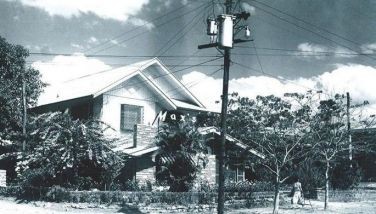Professional squatters

March 22, 2006 | 12:00am
Is Presidential Decree 772 or the "Anti-Squatting Law" still effective? What is the meaning of "Professional Squatters"? These are the questions raised in this case of DCHI.
DCHI, a duly organized corporation, was the owner of 12 parcels of residential land in Cubao. On August 24, 1993, it filed before the City Prosecutor’s Office a complaint against 21 occupants of said parcels of land for violation of the Anti-Squatting Law or PD 772. After preliminary investigation, the City Prosecutor resolved to file before the Metropolitan Trial Court (MeTC) separate but identical Informations against the said occupants. On November 10, 1993, DCHI filed another complaint against four more occupants and the City Prosecutor also resolved to file four separate Informations against the said occupants.
The first 21 Informations were eventually dismissed by the Regional Trial Court as it declared PD 772 unconstitutional with the adoption of the 1987 Constitution and the enactment of Republic Act 7279, the governing law with respect to the subject of "squatting", otherwise known as the "Urban Development and Housing Act of 1992". The RTC set aside the order of the MeTC denying the occupants’ motion to quash the Informations. On the other hand, the four Informations subsequently filed were upheld by another branch of the RTC which ruled that PD 772 had not yet been declared by the Supreme Court as unconstitutional so its constitutionality had to be accepted. The two cases thus reached the Supreme Court on the sole issue of whether PD 772 was still valid and effective as to be the basis of criminal complaints against the occupants of lands belonging to another.
In its ruling, the Supreme Court said that Congress has already expressly repealed PD 772 by the enactment of Rep. Act 8368 or the "Anti-Squatting Law Repeal Act" which took effect on December 27, 1997. Pursuant to said law all pending cases under PD 772 shall be dismissed upon its effectivity. And after the repeal of PD 772, the governing Law with respect to the subject matter of squatting is the Urban Development and Housing Act of 1992 (R.A. 7279). Under this law, only professional squatters or members of squatting syndicates are liable for imprisonment of six years or a fine of not less than P60,000 but not more than P100,000. "Professional squatters" are individuals or groups who occupy lands without the express consent of the landowner and who have sufficient income for legitimate housing. The term shall also apply to persons who have previously been awarded home lot or housing units by the Government but who sold leased, transferred the same to settle illegally in the same place or in another urban area, and non-bona fide occupants or intruders of lands reserved for social housing. So the criminal cases under PD 772 against all the occupants were dismissed (De Castro Homesite Inc. vs. Leachon et. al. G.R. 124856 March 10, 2005. 453 SCRA 101). Without expressly saying so, the ruling seems to imply that the occupants may be sued again if they fall within the definition of the term "professional squatters".
E-mail at: jcson@pldtdsl.net
DCHI, a duly organized corporation, was the owner of 12 parcels of residential land in Cubao. On August 24, 1993, it filed before the City Prosecutor’s Office a complaint against 21 occupants of said parcels of land for violation of the Anti-Squatting Law or PD 772. After preliminary investigation, the City Prosecutor resolved to file before the Metropolitan Trial Court (MeTC) separate but identical Informations against the said occupants. On November 10, 1993, DCHI filed another complaint against four more occupants and the City Prosecutor also resolved to file four separate Informations against the said occupants.
The first 21 Informations were eventually dismissed by the Regional Trial Court as it declared PD 772 unconstitutional with the adoption of the 1987 Constitution and the enactment of Republic Act 7279, the governing law with respect to the subject of "squatting", otherwise known as the "Urban Development and Housing Act of 1992". The RTC set aside the order of the MeTC denying the occupants’ motion to quash the Informations. On the other hand, the four Informations subsequently filed were upheld by another branch of the RTC which ruled that PD 772 had not yet been declared by the Supreme Court as unconstitutional so its constitutionality had to be accepted. The two cases thus reached the Supreme Court on the sole issue of whether PD 772 was still valid and effective as to be the basis of criminal complaints against the occupants of lands belonging to another.
In its ruling, the Supreme Court said that Congress has already expressly repealed PD 772 by the enactment of Rep. Act 8368 or the "Anti-Squatting Law Repeal Act" which took effect on December 27, 1997. Pursuant to said law all pending cases under PD 772 shall be dismissed upon its effectivity. And after the repeal of PD 772, the governing Law with respect to the subject matter of squatting is the Urban Development and Housing Act of 1992 (R.A. 7279). Under this law, only professional squatters or members of squatting syndicates are liable for imprisonment of six years or a fine of not less than P60,000 but not more than P100,000. "Professional squatters" are individuals or groups who occupy lands without the express consent of the landowner and who have sufficient income for legitimate housing. The term shall also apply to persons who have previously been awarded home lot or housing units by the Government but who sold leased, transferred the same to settle illegally in the same place or in another urban area, and non-bona fide occupants or intruders of lands reserved for social housing. So the criminal cases under PD 772 against all the occupants were dismissed (De Castro Homesite Inc. vs. Leachon et. al. G.R. 124856 March 10, 2005. 453 SCRA 101). Without expressly saying so, the ruling seems to imply that the occupants may be sued again if they fall within the definition of the term "professional squatters".
BrandSpace Articles
<
>
- Latest
- Trending
Trending
Latest
Recommended

April 16, 2025 - 12:00am

April 14, 2025 - 12:00am





















